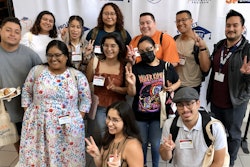The White House Initiative on Educational Excellence for Hispanic
Americans has a new director, but who is speaking for other
underrepresented groups?
Last month, Sarita E. Brown was named the new executive director of
the White House Initiative on Educational Excellence for Hispanic
Americans, becoming the third person since the initiative’s inception
to hold this position. While the appointment has been warmly received
by members of the education community, it also raises anew questions
about who speaks for people of color in higher education.
The Hispanic initiative, which was originally launched in 1990 and
was reauthorized in 1994, will have a staff of three based in the
Washington headquarters of the Department of Education and has a budget
for fiscal year 1998 of $70,000. It is the second of three such White
House offices charged with representing the educational interests of
ethnic constituencies. The other two are: the White House Initiative on
Historically Black Colleges and Universities (HBCUs), and the White
House Initiative on Tribal Colleges.
Unlike its sister agencies, – whose primary focus is to be an
advocate for their member institutions – the Hispanic initiative’s
mandate is to be an advocate for the educational concerns of Latinos at
every level of the education system, from before kindergarten through
college – irrespective of whether the students it advocates for attend
Hispanic Serving Institutions (HSIs).
“We’re literally the waterfront,” says Brown, who was born in New
York and grew up in Texas. Brown is the creator and former head of a
minority outreach program for graduate programs at the University of
Texas-Austin – a sister program to that which came under fire in the
Hopwood v. Tbe University of Texas School of Law case. She also is a
former assistant dean of academic affairs at American University.
“In her job [Brown] is a spokesperson for what the commission feels
is important to the Hispanic community,” says Dr. Eduardo Padron,
president of Miami-Dade Community College and a member of the
president’s Hispanic advisory commission that Brown’s office reports to.
“It is my responsibility to keep vigilant on keeping open
opportunities for Latino Americans,” Brown says. “The changing
demographics make this… absolutely crucial…. We have the platform
of the commission. Now the question is implementation.”
African Americans at TWIs: The Voiceless Black Majority
“There is a counterpart [to Sarita Brown] for African Americans
Catherine LeBlanc, [who heads the HBCU initiative].” says Hector Garza,
the American Council on Education’s vice president for access and
equity. But, when reminded that LeBlanc’s advocacy responsibilities are
for HBCUs only, Garza admits, “From that standpoint, there is no
counterpart.”
His misperception is not uncommon. While there are at least three
organizations advocating for the interests of African Americans in
higher education – the National Association for Equal Opportunity in
Higher Education, (NAFEO), The College Fund/United Negro College Fund
(UNCF), and the White House Initiative on Historically Black Colleges
and Universities (HBCUs) – the primary focus of these groups is to
preserve and enhance historically Black institutions and the students
they serve – about 16 percent of all African American college students,
according to the African American Education Data Book produced by The
College Fund.
“Is there any central organization that speaks to all the issues
African Americans face in higher education? No.” says Dr. Reginald
Wilson, senior scholar at the American Council of Education “It’s a
real dilemma. No one is speaking for the [84] percent [of African
Americans in higher education who do not attend HBCUs]. They say they
do. but they don’t.”
Wilson points to admission standards and campus atmosphere as
examples of issues that do not lend themselves to a legal analysis and
therefore are not being addressed by the existing Black organizations.
“We’ve been very clear about our mission to be inclusive.” says
William Gray, president of The College Fund/UNCF “We’ve sought to raise
serious questions over what the consequences will be in the
post-Proposition 209 era and the limitations of testing to screen
students for admission to institutions. We have been speaking out on
these issues.”
Still, Gray admits. mobilizing for affirmative action is not a
leadership role for UNCF. “We need to see more leadership from public
officials – and the White community has to stand up for affirmative
action,” he says. “That’s where we need to see more initiative.”
Dr. Claude A. Mayberry, chair of the National Commission for African
American Education, a new organization being spearheaded by Congressman
Major R. Owens (D-N.Y.), sees a need for a different type of political
activism for Blacks in higher education. One of his concerns is that
the existing African American leadership has not aggressively addressed
the role that community colleges are going to play in educating the
workforce.
“We’ve got to change the paradigm of how we look at community
colleges,” he says, adding that his new commission will engage in
“political advocacy to the extent that it does not violate non-profit
status.”
Deborah Carter, deputy secretary for the Office of Minorities in
Higher Education at the American Council on Education (ACE) says that
another federal entity or commission to deal with issues outside the
initiative on historically Black colleges would be excellent. “But at
the same time I don’t think anything needs to be done that would take
funding from the current initiative or weaken the focus on historically
Black institutions.”
Lloyd Hackley, chairman of the board for the White House Initiative
on HBCUs doesn’t see the need to create a new advocacy group because,
he says, the current HBCU initiative already has an inclusive mission –
even if the name does not reflect that.
In the early 1980s when the HBCU initiative was first started, it
was focused more on Black college issues, Hackley says. But with its
second executive order in 1993, he says, the document describing the
initiative did not limit it to HBCU concerns.
“There are people on our commission [who] think all the time about
what is happening in the K-12 process and whether it is meeting the
needs of children so that they may attend either a historically Black
or historically White college and succeed. At the same time, we
understand that Black colleges hold a very important position in
society and the importance of holding on to the cultural
responsibility,” Hackley says.
Similarly, Dr. Henry Ponder, president and CEO of NAFEO, says his
organization plans to broaden its mandate to include issues of
importance to African Americans in traditionally White institutions. He
agrees with Hackley that another organization to represent African
Americans is not needed, but he is interested in working with the other
ethnic advocacy groups.
Despite the expressed concerns of existing Black advocacy groups
about the plight of African Americans at traditionally White
institutions, there is little tangible evidence that these sentiments
have become manifest in the form of activism or programming.
Too Many Agencies, Not Enough Resources?
Critics of these ethnic White House initiatives charge that there
are too many and that they are competing for the same resources. Sarita
Brown argues to the contrary.
“The HBCU Initiative has its hands full keeping attention focused on
the contributions of HBCUs,” Brown says. “While there may be some
overlapping, each organization has its role.”
Asked if there is tension with African Americans in allocation of
resources, Padron says, “We shouldn’t be fighting over crumbs of the
pie. We should be fighting for a bigger pie. Our needs are in common.”
According to Hackley, the HBCU and Hispanic initiatives have been
meeting together frequently in the recent past and he is open to
holding similar meetings with the Tribal College initiative.
“We would do well to meet with all these groups that are concerned
about how America’s education system serves minorities,” he says.
“We shouldn’t get into the posture that because another group gets
something, we feel that we have to have it,” Ponder says. “For example,
Hispanics don’t have institutions founded by Hispanics serving
Hispanics. I applaud them [Hispanics for] getting the White House
Initiative… “I think across the spectrum we need to work together.
Then maybe one organization could work for all in different arenas. I
would like to see us get to that point,” Ponder says.
Brown sees her initiative as “an important group in a constellation
of educational advocates.” “Partnering has always been a part of
achieving goals and now I will be working very closely with the
Hispanic Association of Colleges and Universities (HACU) to achieve the
higher education goals of the Hispanic initiative.”
RELATED ARTICLE: Tribal Representation
When the time came in 1996 to set a mission for the White House
Initiative on Tribal Colleges, the founding commissioners had the
benefit of looking at what the HBCU and Hispanic initiatives had done.
Veronica Gonzales, executive director of the American Indian Higher
Education Consortium (AIHEC), says one of the primary concerns was to
avoid weakening the focus on tribal colleges. In addition, there was
concern about the complexity of having the initiative (a U.S.
governmental entity) represent the K-12 system, which operates under
the authority of the Bureau of Indian Affairs, Gonzales says.
“We [AIHEC and tribal college presidents] met with policy makers
from the HBCU and Hispanic initiatives and discussed what the
advantages and disadvantages might be of having a broad versus a
college-only focus when we learned that the tribal college initiative
would be funded,” Gonzales says.
The commissioners decided upon a structure that was a little like
the HBCU and the Hispanic initiatives but unique and tailored to the
special needs of the tribal colleges Gonzales says.
“Because the tribal colleges are severely underfunded – the
lowest-funded colleges in the nation – it was agreed that the main
focus should be on the tribal colleges, with some K-12 goals included
in the mission,” Gonzales says.
Contributors to this story include: Joan Morgan, Ronald Roach and Karin Chenoweth.
COPYRIGHT 1997 Cox, Matthews & Associates
© Copyright 2005 by DiverseEducation.com















